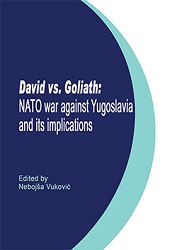THE CASE CONCERNING LEGALITY OF USE OF FORCE BEFORE THE INTERNATIONAL COURT OF JUSTICE - 20 YEARS AFTER THE NATO INTERVENTION IN YUGOSLAVIA
THE CASE CONCERNING LEGALITY OF USE OF FORCE BEFORE THE INTERNATIONAL COURT OF JUSTICE - 20 YEARS AFTER THE NATO INTERVENTION IN YUGOSLAVIA
Author(s): Duško Dimitrijević
Subject(s): Law, Constitution, Jurisprudence, International Law, Security and defense, Military policy, Peace and Conflict Studies
Published by: Институт за међународну политику и привреду
Keywords: Yugoslavia; Serbia and Montenegro; UN; Security Council; NATO’s unilateral intervention; legality of use of force dispute; ICJ; international law
Summary/Abstract: The Federal Republic of Yugoslavia filed on 29 April 1999 Applications before the International Court of Justice (ICJ) against ten NATO member States: the United States of America, the United Kingdom of Great Britain, France, Germany, Italy, Belgium, the Netherlands, Canada, Portugal and Spain. These Applications required the determination of the responsibility of these States for the wrongful acts committed during the armed intervention in connection with violations of the principle of the prohibition of the use of force against sovereignty, territorial integrity and independence of States (crimes against peace), then violations of the rules and principles of war and humanitarian law (war crimes), and obligations established by the Genocide Convention (crimes against humanity and international law). In the following study, the legal arguments of the parties presented in the proceedings were analyzed. Also, the study provides an analysis of the legal bases offered for the establishment of the ICJ jurisdiction, as well as the decisions made by the ICJ on that occasion with which it declared the lack of its jurisdiction. However, irrespective of this fact and circumstances that it had not decided on the merits of the dispute, the ICJ did not exclude the responsibility of the NATO member States for violating the general international law. In that sense, its conclusion is consistent because it confirms the rule that the States have remained “in all cases responsible for acts attributable to them that violate the rights of other State”. Therefore, the re-examination of the case concerning legality of use of force before the ICJ twenty years after the armed attack on Yugoslavia is in line with the efforts of the Republic of Serbia (as the legal successor of the SFR Yugoslavia, Federal Republic of Yugoslavia and State Union of Serbia and
Montenegro) to resolve all outstanding issues from the past, which is a prerequisite for building a new and more peaceful world.
Book: DAVID vs. Goliath : NATO war against Yugoslavia and its implications
- Page Range: 72-96
- Page Count: 25
- Publication Year: 2019
- Language: English
- Content File-PDF

